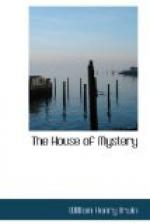“So you too are glad to be at home!” he said. “I’m so glad that I don’t want to lose sight either of a skyscraper or of apple trees for years and years. I can’t remember when I’ve ever wanted to stay in one place before.”
She laughed—the first full laugh he had heard from her. It was low and deep and bubbling, like water flowing from a long-necked bottle.
“Just a moment ago, we were confessing that we were crazy for the Orient.”
“I’m glad to be caught in an inconsistency!” he answered. “I’ve been afraid, though, that this desire to roost in one place was a sign of incipient old age.”
She looked at him directly, and for a moment her fearless glance played over him, as in alarm.
“Oh, I shouldn’t be afraid of that,” she said. “I don’t know your age, of course, but if it will reassure you any, I’d put it at twenty-eight. And that, according to Peter Ibbertson, is quite the nicest age.” Her face, with its unyouthful capacity for sudden seriousness, grew grave. Her deep blue eyes gazed past him out of the window.
“I’m only twenty-four, but I know what it is to think that middle age is near—to dread it—especially when I half suspect I haven’t spent the interest on my youth.” She stopped.
Dr. Blake held his very breath. His instincts warned him that she faltered at one of those instincts when confidence lies close to the lips. But she did not give it. Instead, she caught herself up with a perfunctory, “I suppose everyone feels that way at times.”
Although he wanted that confidence, he was clever enough not to reach for it at this point. Instead, he took a wide detour, and returned slowly, backing and filling to the point. But every time that he approached a closer intimacy, she veered away with an adroitness which was consummate art or consummate innocence. His first impression grew—that she “did” something. She had mentioned “Peter Ibbertson.” He spoke, then, of books. She had read much, especially fiction;




